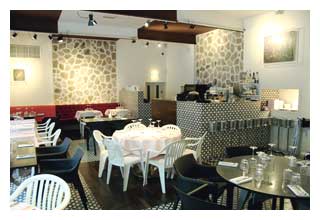Pop-up restaurants – now you see them, now you don't
One minute they're there, the next they've gone - the pop-up restaurant breaks all the rules of what a traditional restaurant should be. Yet this increasing trend for temporary hospitality structures seems to
be working for its perpetrators, says Tom Vaughan.
They call them sites for art's sake: stylish bars and restaurants geared for short, sleek lives filled with those in the know. Springing up in warehouses, town squares and empty rooms, before closing shortly after, pop-up bars and restaurants have been the global offspring of the past few years, a noughties must for the ever-transient "in" crowd.
Sometimes they come with a message, like Greenhouse by Joost in Melbourne, Australia, a restaurant built entirely from recycled materials and serving ingredients grown on its roof, or the Double Club in Islington, an attempt at ethnic synergy with a half-British, half-Congolese concept. Almost always they are the brainchildren of artists, the whole set-up an installation geared for maximum effect in a limited time.
Some - bars, usually - pop up for just a few days, other just a few weeks. Some, like the Double Club, stick around for months. We've seen Alcoholic Architecture, a venue in London that lasted just a few days and offered a breathable gin and tonic mist. We've seen the Smirnoff Black Ice Bar at the Bluebird Cafe and the Plateau Ice Bar in Canary Wharf, both seasonal ventures backed by the famous vodka drink, and whose stars would have quickly faded had they kicked around for longer than a few weeks. And there's been Reindeer and Flash from the guys behind London restaurant Bistrotheque, limited-edition Christmas restaurants that were harder to get into than a papal conclave.
Whatever their format, they tap into the capricious 21st-century consumer mindset.
FLASH
After the runaway success of the Reindeer, an exclusive Chistmas-time temporary restaurant above a car park in east London, Pablo Flack, David Waddington and Tom Collins, the trio behind London restaurant Bistrotheque, returned two years later with Flash. Housed in the West Room at the Royal Academy of Arts in London, as part of the GSK Contemporary arts season, the restaurant ran for 80 days, from 1 November 2008 to 19 January 2009, and employed 50 staff on various shifts to deal with the 120 seats.
The idea for the temporary restaurant came to Flack in the last few days of the Reindeer, he says, based on the concept of a room within a room, with collaborating artists helping aspects of the design. Like the Reindeer, Flash proved a phenomenal success, serving 12,500 covers - more than 150 covers a day - over the course of its lifespan.
Despite this, Flack seems cagey about saturating the market. "They take a lot of work to set up," he says, "which makes them more fun."
But what is the secret of their appeal? "Why are limited editions successful? Because the supply is limited. The same applies here."
DOUBLE CLUB
The brainchild of Belgian artist Carsten Höller - the designer behind the temporary slides in the Tate Modern - the Double Club describes itself as a place for diners, drinkers and revellers to enjoy two forms of hospitality at once - Western and Congolese.
The installation of the pop-up, in a Victorian warehouse in Islington, took months. First, all the building was brought up to scratch - with new glass panes put into the skylight and separate partitions made for the restaurant, kitchen, bar and club areas.
With structural changes made, everything else in the site was put in as a temporary installation. From the wall paintings and tiles to the revolving DJ booth, part-glossy metal, part-wood shack bar to the glass panelling, everything can be removed when the concept's six-month run ends.
Headed by Mourad Mazouz, the brains behind London's Momo, the mix between Congolese and Western cultures is everywhere, from a menu divided between European and Congolese food - with ingredients specifically imported from Africa - to the music, drinks and tables, which, after being couriered from the Congo, must be the most expensive in London, according to general manager Noel Goddard.
With all profit going to Congolese charity the City of Joy, and with the phenomenal popularity seeing the restaurant serve 800 covers a week, and the bar play host to twice that number, the Double Club extended its closing date by four months until the end of July, at which point everything will be taken down and put into storage until Höller decides if he wants to move the concept to another city.











